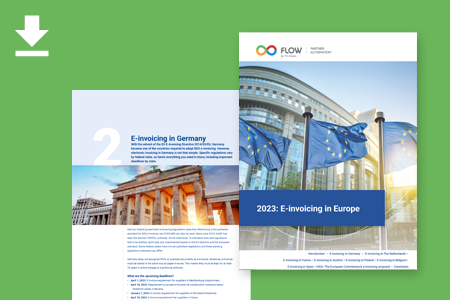Updated in June 2024
State of E-Invoicing in Slovakia
Public entities must be able to process the incoming e-invoices if the supplier chooses this method. The Slovak government plans to introduce a new continuous transaction controls (CTC) system for domestic B2B and B2C transactions, which is now scheduled to become mandatory from 2025 (originally planned for 2024). The government's Electronic Invoice Information System (IS EFA) is under development and will handle B2G e-invoices. The authorities allowed voluntary participation for testing purposes in 2023.
According to the Ministry of Finance, the introduction of the e-invoice should contribute to further reduction of the tax gap on value added tax (VAT) and income tax. For quarterly VAT payers, the delay now makes up to 117 days. It allows taxpayers to become uncontactable, the Ministry of Finance says.
Why does Slovakian government shift towards e-invoicing? The transmission of invoice data from taxable entities to the Tax Administration is an essential part of the measures taken by the Ministry of Finance and the Tax Administration. It allows to
• combat tax fraud,
• reduce the tax gap,
• increase the efficiency of tax collection
• improve the overall effectiveness of the system.
There are several reasons to why electronic invoices outstand PDf- based and papers invoices:
• E-invoicing improves the overview of invoices and taxes,
• It provides a quick and accurate overview of individual transactions,
• E-invoices streamline the invoicing process
• E-invoicing saves costs in processing and delivering invoices (e.g. printing, postage, etc.)
• It eliminates the requirement to display invoices on websites,
• It eliminates barriers for businesses to cross-border communication and electronic invoicing between EU countries.
B2G E-Invoicing in Slovakia
The main objective of IS EFA is the implementation of Directive 2014/55/EU of the European Parliament and of the Council of 16 April 2014 on electronic invoicing in public procurement. The Directive establishes the obligation to report invoicing data in commercial transactions between public institutions and their suppliers. At the same time, the Directive allows for the extension of e-invoicing to the private sector.
The first wave of mandatory B2G e-invoicing is expected in Q1 2024. It starts with specific government entities and contracts exceeding €5,000. The rollout will occur in stages, with more entities and lower thresholds added over time. Stay updated on the Ministry of Finance website for specific timelines.
All e-invoices for public authorities must be sent through the IS EFA platform once it's fully operational. The Ministry of Finance of the Slovak Republic presented the technical solution of the new electronic invoicing information system E-faktúra. It is a system of guaranteed electronic invoicing and transmission of invoice data to the financial administration.
The Ministry of Finance of the Slovak Republic, in close cooperation with the Tax Administration, is implementing a unified process of electronic invoicing and sending structured invoice data to the Tax Administration via an information and communication solution - the Electronic Invoicing Information System (IS EFA).
In particular, the implementation of guaranteed electronic invoicing contributes to reducing the administrative burden on businesses. The IT-system is a free to access online tool which helps small businesses to create and manage e-invoices in the right electronic format as well as checks e-invoices in real time.
For companies using their own software tools, the EFA IS offers an open programming interface that allows companies to transfer invoices generated in their systems to the EFA IS without any further user intervention.
Last but not least, the introduction of uniform e-invoicing across the European Union will help to promote cross-border trade and establish interoperability in the field of e-invoicing, while increasing the transparency of invoices issued and received by public administrations.
B2B E-Invoicing in Slovakia
B2B electronic invoicing in Slovakia is not yet mandatory. Business-to-business (B2B) transactions carried out in the private sector between entrepreneurs will be part of the second phase of the solution, so called "big e-invoice".
The third phase concerns business transactions between entrepreneurs and their customers, the so-called B2C (business-to-customer) segment. Both of these phases should not be implemented before 1.1.2024, due to the interrupted legislative process.
The original intention, to launch the e-invoice reporting system from 2023 for all types of transactions and the introduction of the so-called "big e-invoice", has thus been postponed, and the likely time horizon for the launch of the e-invoice reporting obligation for B2B and B2C transactions is early 2024. The deadline has been postponed on the basis of the FSRS' promise that companies will have at least one year to test the e-invoice system.
The Ministry of Finance of the Slovak Republic has published a draft amendment to the Slovak VAT Act, which brings significant changes to electronic invoicing through the eKasa system.
One of the main proposals is to tighten the rules for tax deductions based on eKasa client cash documents. Currently, a tax deduction is possible if the total value, including tax, does not exceed EUR 1,000 for cash payments or EUR 1,600 for credit card payments. The amendment proposes to reduce these thresholds to EUR 400 for better control and to minimize multiple deductions from a single receipt.
Apart from the governmental tools, businesses in Slovakia can choose various e-invoicing solutions, including web applications, EDI providers, and specialized software. For example, Slovakia uses the PEPPOL BIS Billing 3.0 format for e-invoices, ensuring compatibility across different solutions.
Conclusion
E-invoicing is becoming increasingly important in both B2B and B2G transactions across Europe. A few years ago, it was mostly voluntary and only those who were aware of the security, convenience and data automation benefits of e-invoicing took advantage of it. Today, if you are a company registered in Slovakia or have Slovak business partners, you need to comply with B2B e-invoicing regulations both in Slovakia and in your country of registration.
If you need to fulfill the e-invoicing requirements not only in Slovakia, but also other countries, make sure you choose an international e-invoicing provider. At SPS Commerce, we elevate more than 150 companies around the globe with secure and compliant electronic invoicing solution. Entrust this business to real professionals and never have the pain of staying compliant in Slovakia, USA, Australia or any other country. Schedule a no-obligation consultation to learn more.




